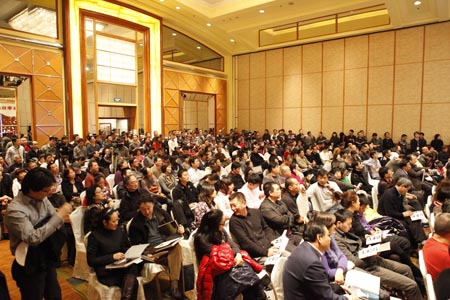Chinese art market continues to boom
|
|
|
Auction house in Beijing. [Global Times] |
Behind the scenes
"As long as you have good pieces by famous artists, or rare antiques, you'd never worry about how high a prices could fetch," a staff member at Hanhai told the Global Times, saying that after two years' of sharp rise in prices, all auctions houses workers and collectors know this maxim.
The wars between the several domestic auction giants are on even before the sales start. The competition now is for sellers, not buyers.
Dong Guoqiang, president of Beijing Council, another auction house, said that they've already started their preparations for the spring sales next year, just several days after finishing the autumn sales.
The worldwide journey to find works has started, Dong said. The US, European countries and Southeast Asia are all targets, as countless precious Chinese works are kept in the hands of individual collectors there
"There is a huge demand for precious works in the domestic art market, especially those items returned from overseas," Dong said.
"For us, the next round of battle begins as soon as the auctions finished," he added.
Status symbols
Modern collectors are often motivated by a desire to show off their wealth more than a love of art.
"There are too many people who see buying art as a form of investment," Zhang told the Global Times. "It is undoubtedly good to see more people getting involved in appreciating art, but it can also be harmful in building a healthy, sound art market."
For collectors who love art, such a hot market is definitely a disaster. For the really enthusiastic collectors who keep buying but never sell, there is little chance to get what they want at auctions.
"Prices are too expensive for me," a collector surnamed Wang said. "Like me, many other rivals frequently raised their pads desperately during the auction process, but deep in our hearts we know that we would never be able to get it in the end.
 0
0 







